 10 Items or Less opens Friday in theaters. But if you wait two weeks, you can download it onto your computer. For producer-star Morgan Freeman, it's part of a plan to level the playing field between Hollywood studios and indie distributors.
10 Items or Less opens Friday in theaters. But if you wait two weeks, you can download it onto your computer. For producer-star Morgan Freeman, it's part of a plan to level the playing field between Hollywood studios and indie distributors.
Thursday, November 30, 2006
Coming soon to a monitor near you
 10 Items or Less opens Friday in theaters. But if you wait two weeks, you can download it onto your computer. For producer-star Morgan Freeman, it's part of a plan to level the playing field between Hollywood studios and indie distributors.
10 Items or Less opens Friday in theaters. But if you wait two weeks, you can download it onto your computer. For producer-star Morgan Freeman, it's part of a plan to level the playing field between Hollywood studios and indie distributors.
More Sundacing

IndieWire has the rest of the Sundance '07 lineup. Of particular interest: Craig Brewer's follow-up to Hustle and Flow, new films by indie stalwarts Tom DiCillo and Hal Hartley -- and the final feature directed by the recently murdered Adrienne Shelly.
Wednesday, November 29, 2006
'Apocalypto' now
 For what it's worth: An acquaintance who's not given to excessive hyperbole -- but who is a pretty savvy industry observer -- called me today after seeing an early screening of Apocalypto. The verdict: "Amazing. You've never seen anything like it." Consider yourself forewarned: This year's Oscar race may be about to change...
For what it's worth: An acquaintance who's not given to excessive hyperbole -- but who is a pretty savvy industry observer -- called me today after seeing an early screening of Apocalypto. The verdict: "Amazing. You've never seen anything like it." Consider yourself forewarned: This year's Oscar race may be about to change...
Sundance '07: The frenzy begins
 IndieWire has the scoop: The Sundance Film Festival has announced its competition lineup for 2007.
IndieWire has the scoop: The Sundance Film Festival has announced its competition lineup for 2007.
DeVito's drunken diatribe
Gosh! Do you think he started hitting the bottle after he read the reviews for Deck the Halls?
Post No. 200: Kim loves Godzilla (and Clint and Whitney)
For the 200th posting on this blog, I take -- well, pride probably isn't the right word in this context. Amusement, maybe? In any event: Kim Jong Il may not be able to get new films from Netflix after all if President Bush has his way. And that's a pity, because, as the Associated Press reports, Kim "is said to own an extensive movie library of more than 10,000 titles and prefers films about James Bond and Godzilla, along with Clint Eastwood's 1993 drama, In the Line of Fire, and Whitney Houston's 1992 love story, The Bodyguard." Maybe somebody will slip him a DVD of Casino Royale in return for a promise not to build nukes? (That is, unless Kim soured on 007 after seeing Die Another Day.) Or perhaps all great dictators really prefer Mickey Mouse?
Ode to Noiret
In LA Weekly, Bertrand Tavernier -- director of Coup de Torchon and Life and Nothing But, Philippe Noiret's greatest films -- fondly remembers the actor he describes as "a friend, a brother, a father." (Thanks to Movie City News for the head's up.)
Tuesday, November 28, 2006
Grand 'Motel'
 At the risk of sounding presumptuous at best, paternalistic at worst, I must confess to stirrings of pride as I see Michael Kang's The Motel listed among the five nominees in the Best First Feature category of Film Independent's Spirit Awards. I wrote one of the earliest reviews for this excellent indie when I covered it for Variety at the 2005 Sundance Film Festival. And I've been raving about it ever since to anyone willing to listen. If I helped in any small way to attract some attention for this sleeper -- which I seriously doubt, but please indulge me -- well, I'm a very happy camper indeed.
At the risk of sounding presumptuous at best, paternalistic at worst, I must confess to stirrings of pride as I see Michael Kang's The Motel listed among the five nominees in the Best First Feature category of Film Independent's Spirit Awards. I wrote one of the earliest reviews for this excellent indie when I covered it for Variety at the 2005 Sundance Film Festival. And I've been raving about it ever since to anyone willing to listen. If I helped in any small way to attract some attention for this sleeper -- which I seriously doubt, but please indulge me -- well, I'm a very happy camper indeed.As I noted in Variety: Kang covers some familiar territory in this coming-of-age dramedy about a precocious Chinese-American youth whose family operates a sleazy roadside motel in upstate New York. But Kang manages to stake his own claim to a patch of that well-trod ground by offering a fresh take on characters and conventions, and compelling interest with shrewd, sympathy-inspiring storytelling. In short, The Motel signals the arrival of a singularly talented filmmaker.
Newcomer Jeffrey Chyau impresses with an unaffected yet engagingly expressive performance as 13-year-old Ernest, an overweight daydreamer and budding writer who lives with his cranky mother (Jade Wu), annoying kid sister (Alexis Chang) and ancient grandfather (Stephen Chen) in their family-run motor inn. Ever since his father abandoned them, Ernest has shouldered most of the everyday maintenance responsibilities. Which means that, each day after school, he gets graphic lessons in the seedier aspects of life while cleaning rent-by-the-hour rooms used mostly for illicit trysts.
Working from the novel Waylaid by Ed Lin, Kang emphasizes character detail over plot development, so that the loose-knit narrative evolves as a steady accumulation of sharply-observed, vividly-rendered details. When he isn’t avoiding the bellicose son of long-term residents -- a family even more dysfunctional than his own -- Ernest nurses a crush on Christine (Samantha Futerman), a slightly older teen waitress at nearby Chinese restaurant. Although Christine wants to remain “just friends,” she offers sincere congratulations when Ernest wins “honorable mention” in a local essay contest. But Ernest’s mother is far less supportive – she cruelly mocks her son for his literary ambitions, venting pent-up rage she feels over being abandoned by her husband.
Much of Motel pivots on the budding friendship between Ernest and Sam, a smooth-talking, sharp-dressing Korean-American twentysomething who checks into the motel for a quickie with a hooker, then remains as a long-term renter. Sam, charismatically played by Sung Kang (Better Luck Tomorrow), apparently views his stay at the seedy inn as a self-imposed exile in the wake of a messy break-up with his girlfriend. For all his bad habits – or, more likely, because of them – this obvious ne’er-do-well becomes a surrogate big brother for Ernest, imparting dubious wisdom while trying to prepare the fatherless adolescent for manhood. Not surprisingly, life lessons are taken to heart, with mixed results.
Taking his cue from Francois Truffaut, his most obvious influence, Kang refrains from making any character an out-and-out villain. Even the bully who torments Ernest is as much a victim as a victimizer. And Ernest’s mother, though embittered and often shrewish, has ample reason for her rancor. (Of course, it helps a lot that Jade Wu gives the role enough complexity to prevent the character from curdling into caricature.) But be forewarned: When she berates her son for wanting to tell stories – which, in her mind, is tantamount to lying – more than a few writers in the audience (and not just children of tradition-bound immigrant parents) will wince while remembering similar childhood experiences with disapproving parents.
BTW: The Motel continues to appear in sporadic theatrical release throughout the US marketplace -- it opens Friday in Portland, Oregon -- before its Jan. 30 DVD release. No matter what size screen you get to see it on, you'd do well to check into The Motel.
Monday, November 27, 2006
Yes, 'Two thumbs up!' made the final cut
The TV Land cable network has compiled a list of the 100 greatest catchphrases in television history, from the serious — Walter Cronkite's nightly signoff "And that's the way it is" — to the silly: "We are two wild and crazy guys!"
Kicking Christ -- and 'The Nativity' -- out of a Christmas festival
Ladies and gentlemen, boys and girls: I give you Bill O'Reilly's next great crusade. (And for once, I must admit, I will share his scorn for the PCers involved.)
Sunday, November 26, 2006
Rocky times in Iraq
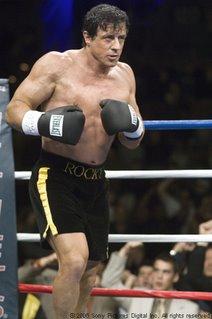 On Wednesday, I got my first look at the trailer for Rocky Balboa. Later that evening, I heard more bad news about the latest casualty figures in Iraq. Ever since experiencing that bizarre confluence, I've been thinking about something Sylvester Stallone told me in 2003 -- back when many folks thought "staying the course" was a great idea. Stallone was talking about the enduring popularity of his Rocky character. But he also wanted to say something about the global influence of made-in-America pop culture -- an influence, I now fear, may diminish as the U.S. occupation continues. The money quote:
On Wednesday, I got my first look at the trailer for Rocky Balboa. Later that evening, I heard more bad news about the latest casualty figures in Iraq. Ever since experiencing that bizarre confluence, I've been thinking about something Sylvester Stallone told me in 2003 -- back when many folks thought "staying the course" was a great idea. Stallone was talking about the enduring popularity of his Rocky character. But he also wanted to say something about the global influence of made-in-America pop culture -- an influence, I now fear, may diminish as the U.S. occupation continues. The money quote:“Something like Rocky eventually gets out of your hands and becomes bigger than you personally could ever be. I’m always taken aback by how long that character has endured. I remember, when I was watching TV coverage of the Iraq War, I saw some Iraqi in some town hold up a flag with Rocky on it. And I thought, ‘You gotta be kidding me! Where did he have this flag for the past 20 years? Under his bed?’ I mean, what was he thinking? ‘Oh, yeah, the day they come here to free us, I’m gonna pull out my Rocky flag!’?”
Sunday linkage
In the New York Daily News, Elizabeth Weitzman talks with the dynamic duo of Jack Black and Kyle Gass -- a.k.a. Tenacious D -- about the mock-rockumentary Tenacious D in the Pick of Destiny. Gass: "We've determined that 83% of the movie is completely true. And the other 17% is ..." Black: "Utter lies."
Meanwhile, over at the L.A. Times, director Richard Donner claims that restoring his original version of Superman II (for DVD release this week) has allowed him to right the wrong that was done to him when he was fired by producer Ilya Salkind before he could finish the 1980 blockbuster. (Richard Lester wound up completing the sequel -- which, truth to tell, fared much better with many critics, including yours truly, than Donner's 1978 Superman: The Movie.) Times writer Geoff Boucher gives Salkind ample opportunity to respond to Donner's comments.
And when it comes to the new DVD itself -- well, Jeffrey Wells is not impressed.
Meanwhile, over at the L.A. Times, director Richard Donner claims that restoring his original version of Superman II (for DVD release this week) has allowed him to right the wrong that was done to him when he was fired by producer Ilya Salkind before he could finish the 1980 blockbuster. (Richard Lester wound up completing the sequel -- which, truth to tell, fared much better with many critics, including yours truly, than Donner's 1978 Superman: The Movie.) Times writer Geoff Boucher gives Salkind ample opportunity to respond to Donner's comments.
And when it comes to the new DVD itself -- well, Jeffrey Wells is not impressed.
Saturday, November 25, 2006
Michael Moore: Voice of reason
From Michael Moore, via Anne Thompson: "Tomorrow marks the day that we will have been in Iraq longer than we were in all of World War II. That's right. We were able to defeat all of Nazi Germany, Mussolini, and the entire Japanese empire in LESS time than it's taken the world's only superpower to secure the road from the airport to downtown Baghdad."
I say that it's time to say "Cut!" and pull the plug on this project. It's over-budget, over-schedule, and likely to be a flop...
I say that it's time to say "Cut!" and pull the plug on this project. It's over-budget, over-schedule, and likely to be a flop...
Early b.o. scorecard
 According to Nikki Finke, Michael Medved's least-favorite holiday movie is still raking in big bucks.
According to Nikki Finke, Michael Medved's least-favorite holiday movie is still raking in big bucks.Keillor on Altman
Garrison Keillor in the Los Angeles Times: Robert Altman "was a very young bomber pilot in World War II, and perhaps that's one reason he didn't fit into the Hollywood system. When you've flown through clouds of shrapnel and survived, you have less respect for the corporate point of view. And he was a smartass, and that didn't help. But what really made Mr. Altman an independent was the fact that he wasn't about long-term planning or risk management, he was about doing the work. He believed in taking big chances and doing it with a whole heart. He didn't mind being talked back to. He said, 'If you and I agreed about everything, then one of us is unnecessary.' But he was the captain of the ship. He didn't care for meetings in which people discuss the arc of the story and whether we need a conflict at this point or not."
Friday, November 24, 2006
Radio alert
 After warming up as a talking head on MSNBC, I'm ready for the big time: On Saturday, I'll be a guest on the popular New Orleans radio program Movie Talk at around 12:15 p.m. Host Dave DuBos wants to talk about Deja Vu, the time-tripping thriller that was filmed on location in The Big Easy -- my home town! -- and you can hear us streamed live from WGSO-AM by clicking here. We'll likely also discuss the recent loss of Robert Altman and Philippe Noiret. And, again, I wouldn't be surprised if a certain subversive movie about peguins figures into the conversation.
After warming up as a talking head on MSNBC, I'm ready for the big time: On Saturday, I'll be a guest on the popular New Orleans radio program Movie Talk at around 12:15 p.m. Host Dave DuBos wants to talk about Deja Vu, the time-tripping thriller that was filmed on location in The Big Easy -- my home town! -- and you can hear us streamed live from WGSO-AM by clicking here. We'll likely also discuss the recent loss of Robert Altman and Philippe Noiret. And, again, I wouldn't be surprised if a certain subversive movie about peguins figures into the conversation.
R.I.P.: Betty Comden (1915-2006)
Alas, these things really do happen in threes. First Robert Altman, then Philippe Noiret -- and now the co-lyricist of the greatest movie musical ever made.
Thursday, November 23, 2006
R.I.P.: Philippe Noiret (1930-2006)
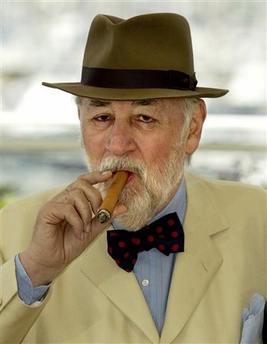 Let us now praise the late, great Philippe Noiret, a consummate artist whose subtlety, versatility and emotional eloquence qualified him as one of European cinema's most valuable natural resources. As usual, GreenCine Daily provides an invaluable assortment of links to admiring appraisals. To those tributes, I humbly add the heartfelt farewell of an unabashedly starstruck fan.
Let us now praise the late, great Philippe Noiret, a consummate artist whose subtlety, versatility and emotional eloquence qualified him as one of European cinema's most valuable natural resources. As usual, GreenCine Daily provides an invaluable assortment of links to admiring appraisals. To those tributes, I humbly add the heartfelt farewell of an unabashedly starstruck fan.No kidding: I count among my most prized memories an afternoon during the 1989 Cannes Film Festival when Noiret -- looking grandly natty in a cream-colored suit – joined me for a long lunch on the patio of a posh hotel. We were supposed to chat primarily about his performance as the projectionist who brings magic and memories to a small Sicilian village in Giuseppe Tornatore's Cinema Paradiso (which had received a standing ovation after its festival premiere on the previous evening.) But the conversation – lubricated, I must admit, by some splendid wine – weaved and wandered lazily among other items on his lengthy resume. I tried very, very hard not to gush, and I think I may have succeeded. But if I didn’t, Noiret was too kind to make sport of me. Indeed, as we parted, he leaned over the table, looked deep into my eyes and graciously murmured: “You asked very interesting questions.” Short, dramatic pause. “And I do not say that to all of your colleagues.” I think I saw other movies, and interviewed other people, during the remainder of the festival. But I don’t remember any of them. All I recall is people asking me why I had such a goofy, glowing grin on my face.
A true international star, thanks in no small part to his fluency in English, Noiret appeared in Hollywood-financed films by Alfred Hitchcock (Topaz), George Cukor (Justine), Ted Kotcheff (Who is Killing the Great Chefs of Europe?), Peter Yates (Murphy's War) and Anatole Litvak (The Night of the Generals). But he was most moving and memorable in the European productions of such estimable auteurs as Francesco Rosi (Three Brothers), Philippe de Broca (Dear Detective), Michael Radford (Il Postino), Louis Malle (Zazie Dans Le Metro) – and, of course, Bertrand Tavernier, Noiret’s most frequent collaborator and the director of the actor’s two best films: Coup de Torchon and Life and Nothing But.
Still, it’s arguable that Noiret remains best known to U.S. audiences for Cinema Paradiso, a sentimental drama that speaks in a quiet but insistent voice to anyone who ever fell in love with (and at) the movies. When we spoke in 1989, he admitted that even he could not remain immune to the potent charm of the film’s seductive nostalgia. ''Yes,'' Noiret said, “I think all of us, we have a little bit of sadness, looking back to the great times of the movies in the theaters.'' In a similar vein, he also admitted to experiencing the occasional pang of melancholy as he remembered movie greats who were no longer with us. He was especially fond of recalling his brief collaboration with Alfred Hitchcock: ''He was so different from the image that he had . . . He was mad about food and filmmaking. So we spent our time talking about food and filmmaking . . . When people say he was bored with actors, that's not true. He was only bored with boring actors.''
Truth to tell, however, all this talk of yesterday was pretty boring to Philippe Noiret. An engagingly witty raconteur, he was never less than courteously forthcoming, and bountifully free with anecdotes, as he answered my questions about his credits. But he much preferred to talk about his new movies, and the movies yet to come.
''I'm not used to looking back to the past,'' Noiret said. ''I'm busy looking ahead, for as long as possible.'' Like most actors, he conceded, he feared each new project would be his last. But that, he added only half-jokingly, merely stoked his eagerness to pounce upon each new offer of gainful employment. ''You never know what will be the success of a film,'' he explained. ''And it's always comfortable to be making another film when you're reading terrible notices for your last film. You can say, 'Well, that's a pity, but I'm already working on another job.' It helps in your living. You see, if you're only making one film a year, or one film every year and a half, it's hard. Because when it's a failure, what do you do? What do you become? You're dead.”
Besides, he added, being a workaholic has its advantages: ''I never get bored. Tired? Sometimes. But bored? Never.''
(Directors, it should be noted, greatly appreciated Noiret’s work ethic. As Giuseppe Tornatore told me: “When you tell Philippe, 'OK, let's shoot a scene,' he'll say, 'Good! Let's play!' Because he enjoys moviemaking that much.")
Noiret was born in Lille, a northern French city near the Belgian border, in 1930. The early '50s found him in Paris, training for a theatrical career at the Centre Dramatique de l'oust. In 1953, he joined the prestigious Theatre Nationale Populaire, where he excelled for more than a decade in a diverse range of classical and contemporary roles. During this period, he also had a less prestigious but more lucrative career as a cabaret performer. ''The cabaret is a very good school for comedy,'' Noiret would say years later. ''Less austere than the theater, and more lively than the movies.''
He made his movie debut in 1956, in Agnes Varda's La Pointe Courte, and quickly attracted the attention of Louis Malle, who cast him – as a cabaret performer! -- in 1960's Zazie Dans le Metro. By 1968, he had graduated to the ranks of leading men, giving an inspired comic performance as a henpecked farmer who earns his liberation in Yves Robert's Very Happy Alexander.
''When I began to have success in the movies,'' Noiret said in 1989, ''it was a big surprise for me. For actors of my generation -- all the men of 50 or 60 now in French movies -- all of us were thinking of being stage actors. Even people like Jean-Paul Belmondo, all of us, we never thought we'd become movie stars. So, at the beginning, I was just doing it for the money, and because they asked me to do it. But after two or three years of working on movies, I started to enjoy it, and to be very interested in it. And I'm still very interested in it, because I've never really understood how it works. I mean, what is acting for the movies? I've never really understood.”
In the specific case of Philippe Noiret, screen acting was a meticulously precise art that appeared unaffectedly, and persuasively, artless. In the naturalistic, no-nonsense tradition of Spencer Tracy and Jean Gabin, Noiret created robust, full-bodied characters with a flawless professionalism that never called undue attention to itself. As I wrote in 1989: “Whether he is playing a fussy, fumbling professor (Philippe de Broca's Dear Detective), a cheerfully corrupt French cop (Claude Zidi's My New Partner), or a crafty duke who controls an under-age Louis XV (Tavernier's Let Joy Reign Supreme), Noiret doesn't appear to be acting at all. He simply is, with total conviction, and usually with the relaxed, rumpled look of an unmade bed.”
Noiret was rarely better, or more believable, than he was in Tavernier's Coup de Torchon, a 1981 psychological thriller based on a novel by the American master of hard-boiled potboilers, Jim Thompson. Tavernier re-located Thompson's story of Southern Gothic corruption to a French colony in 1938 Africa. Noiret played the anti-hero of the piece, Lucien Cordier, a lackadaisical police chief who's openly mocked by the low-lifes of his village and flagrantly cuckolded by his slovenly wife. One dark day, Cordier has an inspiration: Since everyone knows he is a coward, no one would suspect him of being a killer. So he begins a ''clean sweep'' of his village, disposing of the garbage -- brutal pimps, a wife-beating landowner, etc. -- no one will really miss. Unfortunately, Cordier gets carried away with his urban renewal program. Even more unfortunately, his resentments slowly percolate into psychosis. (Warming to the role of executioner, he announces: ''I am Jesus Christ, come back to earth with a new set of crosses!'') And yet, even at his most violent, Cordier remains, almost miraculously, a sympathetic, even vulnerable figure.
In conversation – well, OK, in the single conversation I had with him in 1989 – Noiret was reluctant to discuss his art, preferring to smile gratefully and remain silent when complimented for past achievements. But he did allow, when pressed, that the complexity of his best performances reflected his own off-screen contradictions.
''It's stupid and hard to say at the same time,'' Noiret said, ''but I certainly am an individual who is both fragile and strong -- knowing all the while that I am strong, thanks to a private victory which remains forever private.''
Some of Noiret's private life was spent at home in Carcassonne, near the Spanish border, with his wife, actress Monique Chaumette. ''How long have we been married?” he responded, chuckling at the question. “I don't remember. But we’ve lived together for 30 years now. We met when we were in the Theatre Nationale. And we have been married -- oh, I don't know, 25, 26 years.”
Revealingly, perhaps, Noiret's memory was much sharper when it came to his movie credits. Cinema Paradiso, he said, was his 99th film. Bertrand Tavernier’s Life and Nothing But was his 100th. And, to my mind, his greatest.
Noiret stars to perfection as Major Dellaplane, a career army officer who, during the aftermath of World War I, is obsessed with totaling the exact number of French casualties, and identifying the thousands of French soldiers listed as missing in action. For Dellaplane, the arduous task means keeping countless files, photographing and interviewing hundreds of shell-shocked patients in military hospitals, and personally visiting excavation sites where great numbers of fallen soldiers can be unearthed. A phrase uttered by an amnesiac, a watch or a cup found on a corpse, a letter from home uncovered near a battlefield -- any of these can end a family's long uncertainty, and close one of Dellaplane's files.
But there is always another file, another family. And Dellaplane is running out of time.
Tavernier once explained to me that he modeled Dellaplane after the gruff but compassionate cavalry officer played by John Wayne in John Ford's She Wore a Yellow Ribbon. And, indeed, Noiret plays the French officer with much the same moral authority, virile humor and hard-won wisdom that Wayne conveyed so vividly as Capt. Nathan Cutting Brittles. (When someone chides him for his brutal bluntness while telling a woman of her lover’s death, Dellaplane explains that the best way to deliver such bad news is “by stunning her. You have to strike once, so hard it's like a nightmare. Later you wake up and life seems gentler.”) If Dellaplane seems more contemptuous of his superiors than Brittles ever appeared, and more bitter about the absurdities of battle, well, he has good reason: Dellaplane's office has been ordered to find a French casualty who cannot be identified, to provide an ''unknown soldier'' to be enshrined at the Arc de Triomphe. For Dellaplane, the mission is a terrible charade -- an attempt to divert attention from thousands by focusing on an individual -- and a ridiculous distraction from his duty to end the desperate searches of families and loved ones.
There is a sharply satirical edge to the humor that laces the drama of Life and Nothing But. A sculptor expresses his great joy that, with so many towns ordering monuments to war dead, he will never be wanting for work. Villagers plot to change their boundaries, just so they, too, can claim fallen heroes as their own. Better still, there is a refreshing lack of melodramatic overstatement, in the storytelling as well as the performances. Tavernier never shows us a body, never exploits anyone's anguish. At one point, loved ones file onto a former battlefield to inspect the personal effects of dead soldiers. They don't cry, they don't even appear to be mad anymore. They simply want to bury the dead, so they can get on with life.
Much of Life and Nothing But focuses on Dellaplane's relationship with two women searching for their missing men. Alice (Pascale Vignal) is a young provincial schoolteacher whose fiancé never returned from the war. Dellaplane responds to her as a fond but stern uncle, warning her that, all things considered, she would be better off forgetting her missing soldier. Irene (Sabine Azema) is an aristocratic Parisian whose husband was wounded in combat, and then, apparently, disappeared without a trace. Dellaplane responds to her as -- well, he doesn't quite know how to respond to her.
Tavernier generates suspense and a subdued but palpable erotic tension as he continually allows Irene and Dellaplane to cross paths. Ultimately, she confronts him with a challenge more daunting than any he has ever faced in battle.
And that's when Dellaplane, a man so accustomed to death, must prove he has the courage for a new life.
Life and Nothing But is a great movie, with a great performance at its center. Philippe Noiret is dead. Long live Philippe Noiret.
Wednesday, November 22, 2006
TV Alert!
Set your alarm or your VCR! I'll be chatting with the lovely and talented Alex Witt about holiday movies on MSNBC tomorrow morning -- yes, Thanksgiving Day! -- during the half-hour blocks starting at 8:30 and 10:30 CST. (That's 9:30 and 11:30 EST.) Don't be surprised if a certain subversive movie about penguins enters into the conversation.
Pinko penguins update
 More on the "hidden agenda" of Happy Feet -- here and here. Thank heaven we have moral guardians like Michael Medved looking out for us.
More on the "hidden agenda" of Happy Feet -- here and here. Thank heaven we have moral guardians like Michael Medved looking out for us.More bad news about the film criticism
After reading Roger Moore's insightfully despairing piece about the current state of film critcism -- no, make that the current state of all arts and entertainment coverage in U.S. newspapers -- I thought I'd have a stiff drink. After re-reading it, however, I have changed my mind. To hell with a drink -- just give me the whole damn bottle.
Pinko penguins: Threat or menace?
Keeping in the spirit of the holiday season, let us now give thanks to Fox News for warning us about subversive movies like... Happy Feet?!?!?
Tuesday, November 21, 2006
Hitler speaks!
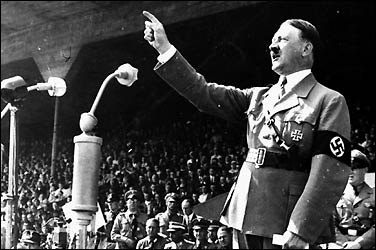 From the Telegraph, yet another item I wouldn't dare make up: "New computer software that can read lips at almost any angle has helped make sense of one of the Second World War's lingering mysteries —Hitler's home movies."
From the Telegraph, yet another item I wouldn't dare make up: "New computer software that can read lips at almost any angle has helped make sense of one of the Second World War's lingering mysteries —Hitler's home movies."No, really -- I didn't make this up.
"The technology allows the dialogue to be dubbed on to the silent films, many of them made by Eva Braun at Hitler's mountain retreat, the Berghof. With the new soundtrack, Hitler can be heard encouraging young children towards a life in the military, criticising even his closest henchmen and flirting with Braun... The film shows very different Hitler from the strident orator who led Germany into war. At ease among his guests, he cracks jokes and talks animatedly about his love for cinema — his tastes included Mickey Mouse.
"He is also seen teasing Braun about a screening in his cinema at the Berghof. 'I understand you didn't like the movie last night," he says. "I know what you want. You want Gone with the Wind.'"
But I want to know: Who's the actor who dubbed Der Fuhrer? And could the dubbed home movies be any more unsettling than a German-produced comedy about Hitler?
R.I. P.: Robert Altman (1925-2006)
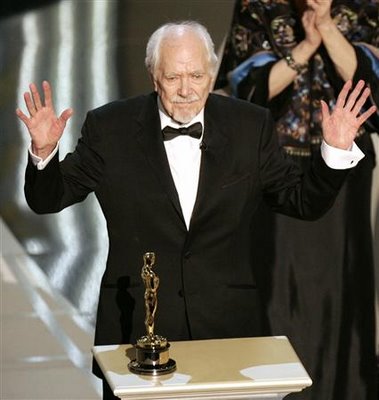 Throughout the decades that Robert Altman sustained his prodigious and prolific career, I often found myself swimming against the critical tide that kept him afloat between his sporadic commercial hits. Truth to tell, I found Kansas City and Cookie’s Fortune to be as mystifyingly under-rated as Gosford Park and Short Cuts were egregiously over-rated. And while I remain adamantly ambivalent about McCabe and Mrs. Miller – though I haven’t seen it in decades; perhaps another viewing is in order -- I count myself in the very small minority of Altman admirers who genuinely enjoyed The Gingerbread Man, one of the maverick moviemaker’s few attempts to work within – and at the same time transcend -- genre conventions. (Author John Grisham, writer of the original screenplay, wasn’t quite so impressed; he had his name removed from the credits when he saw what the free-wheeling Altman had wrought.)
Throughout the decades that Robert Altman sustained his prodigious and prolific career, I often found myself swimming against the critical tide that kept him afloat between his sporadic commercial hits. Truth to tell, I found Kansas City and Cookie’s Fortune to be as mystifyingly under-rated as Gosford Park and Short Cuts were egregiously over-rated. And while I remain adamantly ambivalent about McCabe and Mrs. Miller – though I haven’t seen it in decades; perhaps another viewing is in order -- I count myself in the very small minority of Altman admirers who genuinely enjoyed The Gingerbread Man, one of the maverick moviemaker’s few attempts to work within – and at the same time transcend -- genre conventions. (Author John Grisham, writer of the original screenplay, wasn’t quite so impressed; he had his name removed from the credits when he saw what the free-wheeling Altman had wrought.)And there’s even a warm place in my heart for That Cold Day in the Park (1969), one of Altman’s very first features, an undeservedly obscure drama that percolates with a eroticized sense of danger while a repressed wealthy woman (Sandy Dennis, arguably her last great performance) offers dubious sanctuary to a seemingly homeless young man (Michael Burns).
But, hey, let’s cut to the chase: It would be foolish to pretend that any of the aforementioned titles hold a candle to the three movies that ensure Robert Altman’s immortality.
First and foremost, of course, there is M*A*S*H (1970) – which, by sheer coincidence, I screened for my University of Houston film students last weekend. And I’m happy to report it continues to amuse and amaze as a ballsy, bracing black comedy about blood-splattered high-jinks at a Mobile Army Surgical Hospital that only nominally is set during the Korean War.
(Contemporary audiences weren’t fooled, of course: They instantly recognized the film as the anti-Vietnam War satire that Old Hollywood then was too timid to attempt.)
Donald Sutherland, Elliott Gould and Tom Skerritt have rarely been better than they are here, and the shamelessly non-P.C. humor that bothered some revisionist critics during the 1990s now seems positively benign in our post-Borat era. (Late bloomers, take heart: Altman already was in his mid-40s when he made this breakthrough masterwork.)
Then there’s Nashville (1975), maybe Altman’s greatest film. Even more than American Graffiti, this intricately constructed and densely populated comedy-drama is repeatedly evoked by critics and showbiz journalists in discussions of any film with an ensemble cast, a tangle of interlocking subplots, and a pop-tune soundtrack that propels and underscores the action. It’s difficult for any filmmaker – indeed, it was difficult for Altman himself – to avoid unflattering comparisons to this teeming whirligig of a movie while working in a similar vein on a comparatively large scale. (Paul Thomas Anderson mischievously acknowledged the Altman influence with his wink-wink, nudge-nudge casting of Nashville co-star Henry Gibson in Magnolia.) And it’s next to impossible for anyone – though Anderson comes pretty damn close – to keep as many elements juggled as gracefully as Altman does here.
Last but certainly not least: The Player (1992), Altman’s career-reviving “comeback” after a string of b.o. under-achievers, which enabled the filmmaker to vigorously gnaw on the hands that fed him during the glory days of M*A*S*H and Nashville, then backhanded for more than 15 years afterward. It’s a thoroughly nasty masterpiece, a smart and savvy satire about making movies, destroying lives and getting away with murder. But you don't have to hate Hollywood to love this bleakly, viciously funny story (adapted by scripter Michael Tolkin from his own novel) about an amoral studio mogul (Tim Robbins) who is stalked by a disgruntled screenwriter. Even if you don't catch all the inside jokes or informed references, you can still enjoy The Player for its sheer entertainment value as a modern-day film noir thriller with an abundance of cynical wit and a galaxy of bit-playing superstars. It’s worth noting, by the way, that The Player was considered an odds-on favorite for a Best Picture of '92 nomination until the very day that Oscar nominations were announced. Perhaps the Academy members wanted to send a message: You can gnaw on the hands that feed you, but don't try to chew them off.
No doubt about it: Robert Altman wasn’t the warmest-hearted auteur in the grand pantheon of great filmmakers. (He's wasn't the easiest to interview, either -- just ask Jeffrey Wells.) Indeed, I once wrote that he often came across “as an acerbic cynic who views his characters -- and, to a large degree, his audience -- with equal measures of condescending bemusement and sardonic skepticism.” He struck me as even more irascible, if not downright bellicose, during my occasional interviews with him over the years. (He never tired of taking potshots at Texas, evidently assuming -- wrongly -- it's my native state.) This never affected my reaction to his work – well, OK, hardly ever – but I learned the hard way that there was some truth to cautionary stories (many of them fueled by his legendary break with critic and one-time champion Pauline Kael) that warned of a Robert Altman who never forgot, and rarely forgave.
A few years back, when Altman was filming The Gingerbread Man on location in Georgia, I was assigned by the L.A. Times to do a Sunday Calendar cover story on the shoot. Two days before I was scheduled to arrive, however, I received a phone call from an abashed publicist – the same person who had pitched the piece to the L.A. Times in the first place – who told me that Altman had just decided that he didn’t want me on the set. So I had to ask: “Why?” (What I really wanted to ask: “Altman knows who I am? Me? How?”) The publicist explained: “Mr. Altman didn’t like your review of Ready-to-Wear, and he doesn’t want to talk to you.” My first reaction: “You mean Robert Altman actually reads my reviews?” My second reaction: “Well, if he won’t talk to anyone who panned Ready-to-Wear, he won’t be talking to many people…” (Footnote: I suggested that the L.A. Times send another reporter. The L.A. Times decided to cover another movie instead.)
I was reminded of this misadventure -- even as I felt shamelessly sentimental tears welling in my eyes – while listening to Altman’s gracious acceptance speech a few months back at the Academy Awards, when he was honored with a Lifetime Achievement Award (a.k.a., The Alfred Hitchcock Memorial Consolation Prize for Never Receiving the Oscar for Best Director). “I've always said that making a film is like making a sandcastle at the beach,” Altman told his rapt audience. “You invite your friends and you get them down there, and you say you build this beautiful structure, several of you. Then you sit back and watch the tide come in. Have a drink, watch the tide come in, and the ocean just takes it away. And that sandcastle remains in your mind. Now I've built about 40 of them, and I never tire of it. No other filmmaker has gotten a better shake than I have. I'm very fortunate in my career. I've never had to direct a film I didn't choose or develop. I love filmmaking.”
And, obviously, he loved all of his films – yes, even Ready-to-Wear, and probably O.C. and Stiggs as well – with the same passion. In fact, he accepted the Lifetime Achievement prize as “a nod to all of my films, because to me, I've just made one long film. And I know some of you have liked some of the sections, and others, you – well, anyway, it’s alright.”
Point taken. But I will add this: Even if you don’t think each one was a great film, you must agree that each was made by a great filmmaker. Robert Altman will be missed, to be sure, but he also will be celebrated -- today, tomorrow, for as long as people care about cinema. A director may die, but his movies remain forever in the present tense.
Monday, November 20, 2006
I'm shocked -- shocked, I tell you! -- to read that some film critics might not actually see films they review
But, then again, this might explain why Wet Hot American Summer got such unfathomably upbeat notices from people who should have known better.
Well, at least he'll have those 'Seinfeld' residuals to fall back on
Ever want to see a showbiz career implode right before your very eyes? Click here.
Sunday, November 19, 2006
Correction: Birds beat Bond (but just barely)
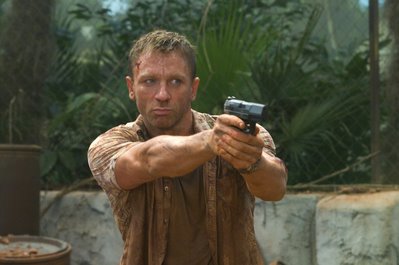 The final b.o. figures won't be reported until Monday, but preliminary estimates suggest that Happy Feet, not Casino Royale, will claim bragging rights for the No. 1 spot this weekend.
The final b.o. figures won't be reported until Monday, but preliminary estimates suggest that Happy Feet, not Casino Royale, will claim bragging rights for the No. 1 spot this weekend.But never mind: The Batman Begins of the 007 franchise smashingly succeeds at establishing a new star (buff and brutal Daniel Craig) as the legendary Brit secret agent, even while offering a darker, edgier and -- dare I say it? -- slightly more realistic take on superspy derring-do. (Ian Fleming very likely would have approved.)
With a minimum of high-tech gadgetry and a maximum of hand-to-hand, fist-to-face, club-to-balls rough stuff, Casino Royale is hugely satisfying and impressively exciting, beginning with an ice-cold black-and-white sequence that has James Bond earning his license to kill, careening through some sensational action set pieces (including a spectacular confrontation on an airport runway, and an ingeniously sustained foot chase throughout Madagascar), lingering on some smoothly (and cleverly) suspenseful card games at the title locale -- poker, not baccarat, is 007's game of choice here -- and climaxing with a thrilling image of Bondian iconography.
My only real complaint is directed at the saggy pacing in the last half-hour or so: There's too much time spent on an obviously doomed romance between Bond and fetching femme fatale Vesper Lynd (Eva Green) after the chief bad guy is dispatched. (So much time, in fact, that even the dimmest bulb in the audience will have long enough to realize that, hey, Something Else is bound to happen before the closing credits.) Otherwise, a great reboot for the series, a welcome treat for long-time fans, and a terrific introduction for newcomers to the 007 mythos.
Saturday, November 18, 2006
Friday, November 17, 2006
Look! Up in the sky! It's a bird! It's a... Well, OK, it's two birds!
Damn! Why can't American-made super-hero flicks have production numbers like this?
Reeling in Denver, Part I: 'Breaking and Entering'
 As he faced a full house on opening night at the 2006 Denver Film Festival, preparing the hundreds gathered at the Ellie Caulkins Opera House for the regional premiere of his coolly intelligent and subtly allusive Breaking and Entering, Oscar-winning filmmaker Anthony Minghella seemed – well, almost apologetic.
As he faced a full house on opening night at the 2006 Denver Film Festival, preparing the hundreds gathered at the Ellie Caulkins Opera House for the regional premiere of his coolly intelligent and subtly allusive Breaking and Entering, Oscar-winning filmmaker Anthony Minghella seemed – well, almost apologetic.Hey, there he was, standing before a crowd of festive festivalgoers, about to insist upon their complete attention, and maybe even make them mildly uncomfortable, while offering a sophisticated drama that dared to be – well, dammit, coolly intelligent and subtly allusive.
“When you’re making a movie,” Minghella confessed, “you have lots of integrity. But when you get around to releasing it, you have none. And right now, I so wish I was showing you the Borat movie.”
Count me among those who are glad Minghella showed his own film instead. Because, with all due respect to the robustly vulgar comedy that has amused ticketbuyers while attracting litigators, Breaking and Entering is something more delicate and substantial, more demanding and rewarding. Days I after I saw it at Denver, it continues to return to my mind, unbidden, with ever-increasing urgency. It’s not for every taste, perhaps, but it’s certainly capable of speaking in a quiet yet insistent voice to anyone with the mind to perceive and the heart to sympathize.
Minghella’s plot, at once elliptical and precise, pivots on the burglaries of an office in the slowly-but-surely gentrifying realm of King’s Cross, a famously seedy area of North London. Will (Jude Law) and partner Sandy (Martin Freeman) are landscape architects who hope to do a little good, and make a bit of money, with grand designs for urban renewal. Unfortunately, some of the locals view the newcomers as fresh meat, not welcome saviors.
After interlopers break into their headquarters on two occasions to swipe laptops, plasma-screen monitors and other high-tech goodies, Will and Sandy decide to lie in wait for a third visit. Although he’s temporarily distracted by one of the neighborhood’s more alluring distractions – Oana, a cynically blunt-spoken Romanian hooker tartly played by Vera Farmiga -- Will spots young thief Miro (Rafi Gavron) attempting yet another looting. Will gives chase, and follows the boy to a flat in a downscale apartment complex. And then things really get complicated.
At home in his far more upscale digs, Will has been drifting apart from Liv (Robin Wright Penn), his long-time live-in girlfriend, a Scandinavian-born beauty who seems determined to test his love by seeing how close she can come to driving him away. He genuinely loves and cares for her and her 13-year-old daughter, Bea (Poppy Rogers), a semi-autistic would-be gymnast, but that’s apparently not enough to keep Liv from suspecting that, somehow, some day, he’ll take a powder. In fact, she’s so certain their days together are numbered that, deliberately or otherwise, she greases the skids for his escape route. Trouble is, the more she questions the long-range prospects for their relationship – “If you were measuring how far we are from where we need to be, would it be too far?” – the more desperately Will seeks comfort elsewhere. And the more attractive he finds Amira (Juliette Binoche), a Bosnian refugee and seamstress who just happens to be, as Will realizes early on, Miro’s mother.
In the world according to Breaking and Entering, there are no real villains. (Well, except maybe for the creep who employs Miro and other teens as break-in artists.) Even the cop determined to nail Miro (a brief but deliciously vivid cameo by Ray Winstone of Sexy Beast) is willing – no, eager – to give his prey a shot at redemption. And as for the romantic triangle at the center of the story, well, Minghella – not unlike Jean Renoir – makes it clear that everyone has his (or her) reasons.
As Will, Jude Law offers an arresting, implosive performance as a basically decent fellow who finds himself driven by the insatiable neediness of the woman he loves into an affair with another woman, and who clutches at the latter as a drowning man might grasp at a life preserver. (Much like his reasons for improving King’s Cross, his motives for embracing Amira are, too put it politely, ambiguous.) Robin Wright Penn is positively fearless in her willingness to appear borderline psychotic while traversing the vertiginous mood swings of a woman filled with so much self-loathing that she cannot accept, will not accept, that anyone could love her. And Juliette Binoche – who earned an Academy Award for her performance in Minghella’s The English Patient – is by turns hard-hearted and heart-wrenching as a displaced person whose motives and desires are charged by alternating currents of maternal instinct and carnal hunger.
Breaking and Entering – which is set to open Dec. 8 in New York and L.A. for Oscar consideration -- is a movie I want to see again, and maybe once more after that. I can’t think of many other movies this year that have evoked a similar response.
Thursday, November 16, 2006
I bet he had more fun at the movies than John Dillinger ever did
Did The Departed get a thumb's-up review from a not-entirely-objective critic? For Martin Scorsese's sake, I certainly hope so.
An 'Inconvenient' Oscar?
If An Inconvenient Truth wins the Oscar for Best Documentary, how will that affect Al Gore's plans for a 2008 presidential bid? Mick LaSalle has an intriguing theory: "If you see a chubby, happy Al Gore standing next to the producer and director, celebrating the win at the Oscars, forget it, he's not running. Nothing to do with Hollywood plays well in the heartland (except the movies themselves). The cultural resentment of Hollywood is almost pathological in certain sections of the country. However, if Gore chooses not to be there -- if he's at the spa that day -- then you can take it to the bank. Big Al's running."
More Bondage
Associated Press movie writer David Germain looks back at two earlier versions of Casino Royale, while another AP scribe reminds us that real-life British spies aren't licensed to kill. Really. Honest. No kidding. Scout's honor.
Wednesday, November 15, 2006
What's that? You say there's a new James Bond movie coming out this weekend? Really? Gee, why haven't we heard more about it?
 But seriously, folks: New York Daily News profiles the "Bond girl" who's clearly uncomfortable with that dubious title, and the on-set photographer who's hugely impressed by the new 007. And long-time Bondophile Louis B. Parks offers a nifty overview of the superspy franchise and an amusing sidebar about Bond's introduction to American audiences (and readers) in the Houston Chronicle.
But seriously, folks: New York Daily News profiles the "Bond girl" who's clearly uncomfortable with that dubious title, and the on-set photographer who's hugely impressed by the new 007. And long-time Bondophile Louis B. Parks offers a nifty overview of the superspy franchise and an amusing sidebar about Bond's introduction to American audiences (and readers) in the Houston Chronicle.
Monday, November 13, 2006
Rocky Mountain High
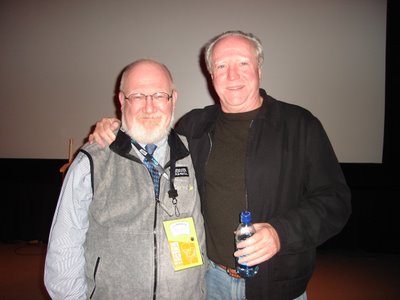 I just flew back from the Denver Film Festival, and boy, are my arms tired. Ba-da-boom! But seriously, folks: This was my first (but I hope not last) visit to one of North America's longest-running celebrations of cinema, and I want to tell you all about it. That is, just as soon as I recover from a mad rush of hearty partying during my last night in the Mile High City. Please stay tuned for detailed reports about, among other things, a delightfully sly, smart and sensitive mockumentary about high school teachers, a surprisingly compelling mutant-monster melodrama from South Korea -- and an ingeniously clever slasher-movie parody that is even better than David Poland reported last spring from South by Southwest. BTW: The latter two films feature Scott Wilson, the prodigiously protean character actor I was honored to query during a special Denver Festival tribute on Saturday night. Once again: More to come.
I just flew back from the Denver Film Festival, and boy, are my arms tired. Ba-da-boom! But seriously, folks: This was my first (but I hope not last) visit to one of North America's longest-running celebrations of cinema, and I want to tell you all about it. That is, just as soon as I recover from a mad rush of hearty partying during my last night in the Mile High City. Please stay tuned for detailed reports about, among other things, a delightfully sly, smart and sensitive mockumentary about high school teachers, a surprisingly compelling mutant-monster melodrama from South Korea -- and an ingeniously clever slasher-movie parody that is even better than David Poland reported last spring from South by Southwest. BTW: The latter two films feature Scott Wilson, the prodigiously protean character actor I was honored to query during a special Denver Festival tribute on Saturday night. Once again: More to come.
Saturday, November 11, 2006
Not a good weekend for 'A Good Year'
As Nikki Finke notes in her early b.o. report: "All I can say is, everybody may want to duck when Russell gets the bad news."
Bloggus interruptus
Sorry about the lack of recent postings. I have been thrown off my schedule by computer mishaps and cross-country travel. Watch this space for further developments.
Tuesday, November 07, 2006
'Adrienne Shelly was murdered!'
A tragic story takes a truly bizarre twist. Expect to see a Law & Order episode with a very similar plot, very soon.
Sunday, November 05, 2006
My new favorite poem
"How to Live"
By Charles Harper Webb
Eat lots of steak and salmon and Thai curry and mu shu
pork and fresh green beans and baked potatoes
and fresh strawberries with vanilla ice cream.
Kick-box three days a week. Stay strong and lean.
Go fly-fishing every chance you get, with friends
who'll teach you secrets of the stream. Play guitar
in a rock band. Read Dostoyevsky, Whitman, Kafka,
Shakespeare, Twain. Collect Uncle Scrooge comics.
See Peckinpah's Straw Dogs, and everything Monty Python made.
Love freely. Treat ex-partners as kindly
as you can. Wish them as well as you're able.
Snorkel with moray eels and yellow tangs. Watch
spinner dolphins earn their name as your panga slam-
bams over glittering seas. Try not to lie; it sours
the soul. But being a patsy sours it too. If you cause
a car wreck, and aren't hurt, but someone is, apologize
silently. Learn from your mistake. Walk gratefully
away. Let your insurance handle it. Never drive drunk.
Don't be a drunk, or any kind of "aholic." It's bad
English, and bad news. Don't berate yourself. If you lose
a game or prize you've earned, remember the winners
history forgets. Remember them if you do win. Enjoy
success. Have kids if you want and can afford them,
but don't make them your reason-to-be. Spare them that
misery. Take them to the beach. Mail order sea
monkeys once in your life. Give someone the full-on
ass-kicking he (or she) has earned. Keep a box turtle
in good heath for twenty years. If you get sick, don't thrive
on suffering. There's nothing noble about pain. Die
if you need to, the best way you can. (You define best.)
Go to church if it helps you. Grow tomatoes to put store-
bought in perspective. Listen to Elvis and Bach. Unless
you're tone deaf, own Perlman's "Meditation from Thais."
Don't look for hidden meanings in a cardinal's song.
Don't think TV characters talk to you; that's crazy.
Don't be too sane. Work hard. Loaf easily. Have good
friends, and be good to them. Be immoderate
in moderation. Spend little time anesthetized. Dive
the Great Barrier Reef. Don't touch the coral. Watch
for sea snakes. Smile for the camera. Don't say "Cheese."
By Charles Harper Webb
Eat lots of steak and salmon and Thai curry and mu shu
pork and fresh green beans and baked potatoes
and fresh strawberries with vanilla ice cream.
Kick-box three days a week. Stay strong and lean.
Go fly-fishing every chance you get, with friends
who'll teach you secrets of the stream. Play guitar
in a rock band. Read Dostoyevsky, Whitman, Kafka,
Shakespeare, Twain. Collect Uncle Scrooge comics.
See Peckinpah's Straw Dogs, and everything Monty Python made.
Love freely. Treat ex-partners as kindly
as you can. Wish them as well as you're able.
Snorkel with moray eels and yellow tangs. Watch
spinner dolphins earn their name as your panga slam-
bams over glittering seas. Try not to lie; it sours
the soul. But being a patsy sours it too. If you cause
a car wreck, and aren't hurt, but someone is, apologize
silently. Learn from your mistake. Walk gratefully
away. Let your insurance handle it. Never drive drunk.
Don't be a drunk, or any kind of "aholic." It's bad
English, and bad news. Don't berate yourself. If you lose
a game or prize you've earned, remember the winners
history forgets. Remember them if you do win. Enjoy
success. Have kids if you want and can afford them,
but don't make them your reason-to-be. Spare them that
misery. Take them to the beach. Mail order sea
monkeys once in your life. Give someone the full-on
ass-kicking he (or she) has earned. Keep a box turtle
in good heath for twenty years. If you get sick, don't thrive
on suffering. There's nothing noble about pain. Die
if you need to, the best way you can. (You define best.)
Go to church if it helps you. Grow tomatoes to put store-
bought in perspective. Listen to Elvis and Bach. Unless
you're tone deaf, own Perlman's "Meditation from Thais."
Don't look for hidden meanings in a cardinal's song.
Don't think TV characters talk to you; that's crazy.
Don't be too sane. Work hard. Loaf easily. Have good
friends, and be good to them. Be immoderate
in moderation. Spend little time anesthetized. Dive
the Great Barrier Reef. Don't touch the coral. Watch
for sea snakes. Smile for the camera. Don't say "Cheese."
Tuesday night viewing tip
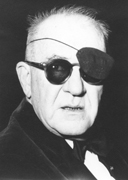 Thanks to Anne Thompson for the head's up: Peter Bogdanovich's new and improved version of his classic documentary Directed By John Ford will be shown Tuesday on Turner Classic Movies, to kick off a month-long Ford retrospective on the invaluable cable network.
Thanks to Anne Thompson for the head's up: Peter Bogdanovich's new and improved version of his classic documentary Directed By John Ford will be shown Tuesday on Turner Classic Movies, to kick off a month-long Ford retrospective on the invaluable cable network.
'Borat' b.o.
According to preliminary box-office figures, Borat: Cultural Learnings of America for Make Benefit Glorious Nation of Kazakhstan hit the No. 1 spot this weekend with an estimated $26.4 million gross. Unlike some of my colleagues, I think 20th Century Fox's limited-release pattern was pure genius. As I've posted elsewhere: If the movie had hit the No. 1 spot while playing in 3,000 theaters, it would be perceived as a hit. In 800 or so theaters, it is perceived as a phenomenon. Now you tell me: What gets more ink, causes more buzz, raises more want-to-see enthusiasm -- a hit or a phenomenon?
For what it's worth: I caught Borat at a 7 o'clock screening last night here in Houston at the AMC 30. It was in one of the biggest auditoriums -- but the house was only half full. The response was largely enthusiastic, however. (I must admit: I laughed loudest at a throwaway sight gag that I don't want to spoil; suffice it to say it involves a bear and a refrigerator.) Once again, unlike some of my colleagues, I can't say I found it any more shocking or "transgressive" than, say, National Lampoon's Van Wilder (remember the eclairs filled with dog semen?) or jackass number two (take your pick of any scene). And I really don't believe all the documentary-style "set-ups" are on the up-and-up. (Note that the filmmakers weren't forced to blur the faces of any "unsuspecting" interview subjects, as often happens in the Jackass movies.) But, hell, funny is funny, and much of the movie is bust-a-gut hilarious.
BTW: Did they have to abruptly cut off the final scene because a gag didn't work? I'm talking about Borat's introduction of his new "wife" back home. I felt like a punchline or a pay-off got left on the cutting room floor. Anyone out there know anything about this?
For what it's worth: I caught Borat at a 7 o'clock screening last night here in Houston at the AMC 30. It was in one of the biggest auditoriums -- but the house was only half full. The response was largely enthusiastic, however. (I must admit: I laughed loudest at a throwaway sight gag that I don't want to spoil; suffice it to say it involves a bear and a refrigerator.) Once again, unlike some of my colleagues, I can't say I found it any more shocking or "transgressive" than, say, National Lampoon's Van Wilder (remember the eclairs filled with dog semen?) or jackass number two (take your pick of any scene). And I really don't believe all the documentary-style "set-ups" are on the up-and-up. (Note that the filmmakers weren't forced to blur the faces of any "unsuspecting" interview subjects, as often happens in the Jackass movies.) But, hell, funny is funny, and much of the movie is bust-a-gut hilarious.
BTW: Did they have to abruptly cut off the final scene because a gag didn't work? I'm talking about Borat's introduction of his new "wife" back home. I felt like a punchline or a pay-off got left on the cutting room floor. Anyone out there know anything about this?
'Martin Scorsese's Next Film To Be Three Hours Of Begging For Oscar'
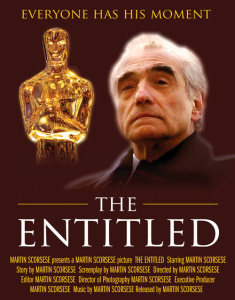 Hilarious stuff from The Onion: A sneak preview of The Entitled, Martin Scorsese's "three-hour, unabashed plea for a Best Director Oscar," coming soon to a theater near you.
Hilarious stuff from The Onion: A sneak preview of The Entitled, Martin Scorsese's "three-hour, unabashed plea for a Best Director Oscar," coming soon to a theater near you."'I've been making pictures for 40 years,' said the intense, fast-talking Scorsese in an excerpt from The Entitled, during which the Rolling Stones' 'Gimme Shelter' can be heard in the background. 'For 40 years, I've been making pictures. And I've always been fascinated with the struggles a man must endure when people don't appreciate him. People say I'm the best. I didn't say it, they did. I just do my work. But for years they've been talking and you know it. You do. I deserve that award, is all I'm saying...
"'You already should have done right by me with Gangs Of New York,' he said. 'I handed you guys that one on a silver platter.'"
Saturday, November 04, 2006
The once and future Bonds
Interesting featurette in the Sunday L.A. Times about the "rebooting" of the James Bond franchise (following the financially successful but critically drubbed Die Another Day) with Casino Royale. Helmer Martin Campbell -- who previously jump-started the series by introducing Pierce Brosnan as 007 in GoldenEye -- admits he wasn't entirely convinced at first that Daniel Craig could take over the superspy role. But that was before he realized the producers wanted to return to the gritty roots of the original Ian Fleming novel. Money quote: "[O]nce I saw where we were going, Daniel was the perfect fit for the story we were telling. The character in the books is much darker than he has been in the movies and that's what we've returned to. It's a more personal, more emotional story than we've seen Bond in before. Daniel has a sexuality that's very much in keeping with how Fleming saw the character."
I realize this is a minority opinion, but I've always felt that, up until now, Timothy Dalton came closer than any other actor to playing 007 as the ruthless SOB that Fleming originally envisioned. Unfortunately, his two Bond movies -- Licence to Kill and The Living Daylights -- were box-office underachievers. For the sake of the series and its longtime fans (and yes, I include myself in their number), I hope Casino Royale makes a bigger splash and comes up a winner.
On the other hand: I can remember a time when Pierce Brosnan was hyped as the new and improved 007...
I realize this is a minority opinion, but I've always felt that, up until now, Timothy Dalton came closer than any other actor to playing 007 as the ruthless SOB that Fleming originally envisioned. Unfortunately, his two Bond movies -- Licence to Kill and The Living Daylights -- were box-office underachievers. For the sake of the series and its longtime fans (and yes, I include myself in their number), I hope Casino Royale makes a bigger splash and comes up a winner.
On the other hand: I can remember a time when Pierce Brosnan was hyped as the new and improved 007...
Friday, November 03, 2006
R.I.P. Adrienne Shelly (1966 - 2006)
 My immediate reaction to news of Adrienne Shelly's tragic death is, of course, deep regret that a bright light has been dimmed much too soon. But I also must admit to equal measures of aching melancholy and wistful nostalgia, as I think of the eternally waifish actress as the poster girl for a specific period in indie cinema -- call it Early Sundance, late '80s to the early '90s -- that now seems almost as distant as the Hollywood renaissance of the 1970s. As Matt Dentler perceptively notes, Shelly "was an evocative and yet subdued force of nature, witty and warm. She was the personification of the 'indie-film muse' during the beginning of the 1990s."
My immediate reaction to news of Adrienne Shelly's tragic death is, of course, deep regret that a bright light has been dimmed much too soon. But I also must admit to equal measures of aching melancholy and wistful nostalgia, as I think of the eternally waifish actress as the poster girl for a specific period in indie cinema -- call it Early Sundance, late '80s to the early '90s -- that now seems almost as distant as the Hollywood renaissance of the 1970s. As Matt Dentler perceptively notes, Shelly "was an evocative and yet subdued force of nature, witty and warm. She was the personification of the 'indie-film muse' during the beginning of the 1990s."I was especially impressed by her work in two early, quirky Hal Hartley comedies -- The Unbelievable Truth and Trust -- that rank among my very favorite movies of the Early Sundance era. While reviewing the latter back in 1991, I wrote: "As Maria, a 17-year-old high-school senior noted for her purple lipstick and surly attitude, Shelly makes one hell of an entrance. The movie begins with Maria's informing her parents that she has dropped out of school, plans to marry her jock boyfriend - and, by the way, is pregnant. Her father, understandably upset, snarls: 'Slut!' Maria slaps his face, and walks out the door. Dad has a sudden heart attack, and falls down dead."
Things go from bad to worse as Maria is rejected by her mom, dropped by her boyfriend, and nearly raped by a convenience store clerk. Fortunately, however, she finds a soul-mate of sorts in Matthew (Martin Donovan), a troubled young man who gradually realizes that maybe he can save himself if he somehow saves Maria. He comes to trust her so much that he shows her his prized possession: a hand grenade that he says he carries with him at all times. ''Why?'' she asks. ''Just in case,'' he responds. ''Are you emotionally disturbed?'' she inquires.
Donovan is terrific, I noted in 1991, but "Adrienne Shelly has the more challenging role -- her character evolves from miniskirted bimbo to self-effacing victim, and from there to something far more formidable -- and she plays it with uncommon skill, grace, intelligence and conviction. Trust is probably the only movie ever made where the heroine must put on, not take off, her glasses before the hero even thinks of kissing her. Shelly makes braininess, and budding confidence, very attractive indeed. When she smiles, you get the feeling she could inspire a man to do anything. She might even get him to give up his hand grenade."
Query: Is it too late for the Sundance Film Festival to schedule a mini-retrospective of Adrienne Shelly's films for Jaunuary 2007?
Thursday, November 02, 2006
That Kerry, what a kidder!
With so much being made of John Kerry's unfortunate attempt at jocularity this week, I'm reminded of an interview I did two years ago with George Butler, the master documentarian (and long-time Kerry buddy), after the Toronto Film Festival premiere of Butler's Going Upriver: The Long War of John Kerry. Specifically, I'm thinking about this exchange:
Q: The common rap against Kerry as a campaigner is that he’s too stiff, too formal. You’ve known him for a long time. What’s the funniest thing you’ve ever heard him say?
Butler: Well, he used to do a terrific Peter Sellers imitation. He could play Inspector Clouseau and so forth. But other than that… I’m just trying to think. [Long pause] What I would say is more interesting about John is to be in a room with him and understand that he just said something that was incredibly insightful, or analytic in just the perfect kind of way.
Translation: He's a brilliant guy, but he's no Richard Pryor.
My take: If someone who's known you for 40 years can't think of a single freakin' joke you've ever told... Well, I dunno, maybe those jokes weren't very funny? So maybe, just maybe, you ought to leave the stand-up to the experts?
(Yes, I voted for the guy anyway. No, I wouldn't want him as my warm-up act.)
Q: The common rap against Kerry as a campaigner is that he’s too stiff, too formal. You’ve known him for a long time. What’s the funniest thing you’ve ever heard him say?
Butler: Well, he used to do a terrific Peter Sellers imitation. He could play Inspector Clouseau and so forth. But other than that… I’m just trying to think. [Long pause] What I would say is more interesting about John is to be in a room with him and understand that he just said something that was incredibly insightful, or analytic in just the perfect kind of way.
Translation: He's a brilliant guy, but he's no Richard Pryor.
My take: If someone who's known you for 40 years can't think of a single freakin' joke you've ever told... Well, I dunno, maybe those jokes weren't very funny? So maybe, just maybe, you ought to leave the stand-up to the experts?
(Yes, I voted for the guy anyway. No, I wouldn't want him as my warm-up act.)
Re-United Artists?
Tom Cruise and producing partner Paula Wagner will take over the studio founded by Mary Pickford, Charlie Chaplin, D.W. Griffith and Douglas Fairbanks. Obviously, Hollywood royalty ain't what it used to be. But, what the hell, good luck to the new moguls.
Coming attraction
Robert De Niro co-stars with 50 Cent? For a movie set in post-Katrina New Orleans? Hey, on opening weekend, I will be so there.
Wednesday, November 01, 2006
Lesson No. 7: Have no shame whatsoever
John Horn of the L.A. Times offers six lessons to moviemakers (and movie stars) seeking Oscar glory. The light and breezy piece touches on recent phenomena -- Shakespeare in Love upsets Saving Private Ryan, Roman Polanski transcends his fugitive status, etc. -- and an amusing blast from the past: Sally Kirkland's 1987 push for a Best Actress nomination, one of the first Academy Award campaigns to successfully employ video screeners as stealth weapons.
American monsters in South Korea
A monster movie in which the bad guys are monstrous American soldiers -- and a "truck-sized, flesh-hungry lizard" -- currently is a big hit in South Korea. But how will it play in America? We'll find out this month when it plays at the Denver and AFI film festivals.
Subscribe to:
Comments (Atom)
